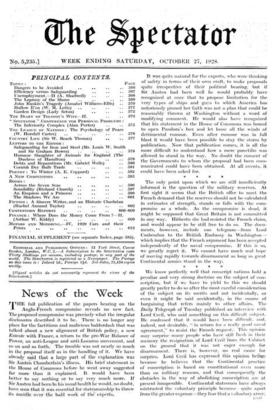We know perfectly well that conscript nations hold a peculiar
and very strong doctrine on the subject of con- scription, but if we have to yield to this we should greatly prefer to do so after the most careful consideration of the subject on its merits and not incidentally, or even it might be said accidentally, in the course of bargaining that refers mainly to other affairs. The Daily Telegraph of Tuesday published an interview with Lord:Cecil, who said something on this difficult subject. He confessed that .it _would have been difficult, and, indeed, not desirable; .`! in return for a really good naval agreement," to. resist the French -request.- This opiniOn may surprise many- people who have still fresh in their memory the resignation of Lord:Cecil Trom the Cabinet on the ground that it Was not eager enough for disarmament. There is, -however, no real cause for surprise. Lord Cecil has expressed this opinion beetle because he believes that the Continental practice of conscription is based on constitutional even more than on military reasons, and that consequently the obstacles in the way of abolishing conscription are at present insuperable. Continental statesmen have always mistrusted the voluntary principle because quite apart fronithe greater expense—they fear that a voluntary army, not being based upon a constitutional civic duty, could be suborned as mercenary armies in the past often were. Personally we have always had a good deal of sympathy with the doctrine that the task of supporting national policy by fighting, if fighting should be necessary, ought to be imposed impartially upon the members of a democracy.





















































